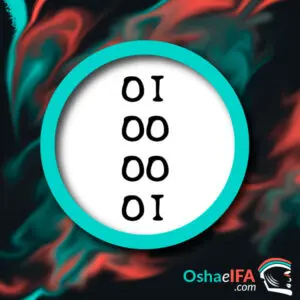Edibere: Meaning, tips, sayings, patakies and more

Edibere (The son of luck), this Odu exhorts us to care more about our own well-being, this sign uses the drum as a metaphor, which brings joy to everyone around it but deep down it is empty. Odi Ogbe is Odu number 62 in the hierarchical order of Ifa.
Ifá says that this person must offer a great sacrifice. He will have a long life and must have a good character. This person is urged not to be ungrateful to his family.
Other names of the Odi Ogbe sign:
- Edibere.
- Odigbere.
- Erdiber.
In the sign of Ifa Edibere is born:
- The box of Baatá drums.
- Vomiting in humans.
- The aging of beverages.
- The son of money and luck.
- The minting of money (it was SHANGO).
- EBIRI: the poison that enters through wounds.
- The transmission of sound.
- Let everything be written down. (the agenda).
- The Seven African Powers.
- The birth in Zurrón.
- YEWA's Itá is made by Ifá.
- That although the Babalawo has made SHANGO he can receive YEWA.
- Memory loss
- They Were Born: The Malevolent Entities
The odu Edibere speaks:
- Ifá speaks of blindness.
- It is an Ifá of vigilance and Investigation.
- He talks about a musician who manages to get special sounds out of the instrument.
- Mice are not killed.
- Awó Odigbere is his mother's godfather.
- It was OSANYIN's betrayal of ORISHA OKO and YEMAYA.
- This is AINA YOGUN. The guiding spirit of IBEJIS.
- It is where BAATA is the true woman of SHANGO.
The Odi Ogbe Sign points out that:
- Here: The crab claws.
- They speak SHANGO and AZOJUANO.
- The herbs are: Jagüey, Cherry and rue.
- Brand contagion, spiritual phenomenon.
- It is the worship of the Igbodun of Smallpox.
- Smallpox was known in the world.
It may interest you: Odu of Ifa Ogbe Di Kaka Ogbe Di Lele
Recommendations of the Odi Ogbe - Edibere sign:
- Here the person maintains intimate relationships with others who are already committed. You have to be careful, because there are those who are watching and will not stop until you are surprised.
- Edibere is an Odu of fighting for the subsistence of life.
- Here we have to drum OSHA, ORISHA and EGUN.
- This Odu speaks of a fight between criminals, where some accuse others to try to destroy them or to take the blame.
- This Ifa Sign speaks of a person who is enjoying something that he did not help build or sacrifice for it.
- Odi Ogbe talks about: Betrayals between coworkers. As a musician who manages to get out of the instrument that plays a special sound that others cannot. Of a person who is dominated by thought through bad arts. Of a person who can drown in the sea. Of a person who struggles in life to be great. Of a person envied even by his own family. Person who is scared, who sees the dead. Take care of that, as it may be your premature death.
- The person with this Odu "Odi Ogbe" is the son of luck and the son of money. Here SHANGO minted the money.
- For this Ifá, mice are not killed and they should be eaten low in salt.
- This Odu "Edibere" is the beginning of creation.
- When Edibere is seen in a woman and she is in a state of pregnancy and the child is in formation, Ifa must be handed over to her immediately so that the mother or child will not perish at the time of delivery (see YEWA path).
- Here SHANGO in one of his ways is called OGIRE-OYU- the one who watches over the King.
- This is where EBIRI was born: The poison that enters through wounds. That is why in this Oddun, you have to take care of your skin and diseases that can be contracted by wounds. It is necessary to have Aroní.
- Here was OSANYIN's betrayal of ORISHAOKO and YRMAJÁ. You have to be careful that by witchcraft they want to separate the marriage.
Sayings of the Odu Edibere:
- Don't go back with what you had.
- EDIBERE's voice fills all IGBODUN of Ifá.
- If a mother gives birth to a child, she can be born again to her child.
- ORUNMILA said: “Bring Heaven to Earth and Earth to Heaven.
- The child who spoke in the mother's womb.
- Ifá spoke in the mother's womb
- The Awó writes it all down, to study it later.
- There is no pregnant woman who cannot give birth to a Babalawo.
- There is no pregnant woman who cannot give birth to Orúnmila himself.
- If a father has forgotten the son,
Prohibitions of the sign of Ifa Odi Ogbe:
Because of this Sign, one must be careful not to speak ill of the saints and less of the Awoses, so that they do not kill him.
Diseases that afflict this Odu: Diseases of the digestive system, leprosy, rashes, respiratory system, cardiovascular problems, diseases of the nervous system.
Because of this Erdibere Sign, you have to take good care of your Ifá, because they can have loss of the IKINES or they can be put OFO.
For this Odu Odi Ogbe you have to put 3 Baatá drums and 3 bottles of brandy next to his Ifá and next to SHANGO.
For this Oddun Edibere four plants are planted in the house. The Iyefá of this Odu is made with royal palm trunk powder and sulfur.
It may interest you: Ifa Odi Meyi sign
Ifa says in the odu Edibere - Odi Ogbe:
You will travel to important places even abroad and that atonement would make him a good change. That he should sacrifice a goat to Eshu and feed the elders of the night and death.
You will be the victim of false accusations unless you make the following sacrifice:
- He should wash his head with appropriate leaves at the Eshu altar and then give him a goat.
- You will have to prepare your Ogún with 2 roosters, 1 machete, 1 lightning stone, give pumpkins to the Awos.
- You must drum the ORISHA to scare away death and disease.
- When a woman is seen in divination, she should be told that she has committed adultery and that there is a living witness to the fact.
When this Odu of Ifa Edibere appears in divination, the person should be warned not to flirt indiscriminately. You must look deeply before falling into erotic chases, to avoid losing your life.
If the guessed person is a man, he will meet a divorced woman in her Father's house. He will make her his partner to give birth to a girl. She is the wife of ORUNMILA. The person should be told to be polite to visitors, and to be prepared, capable, and willing to entertain his visitors as much as he can at all times.
Prayer of the Odu Odi Ogbe (Erdibere):
EDIBERE OMO KORIN INU IYA IFA SORO INU IYA ADIFAFUN OMI TIRO WA.
Suejere Edibere:
IFA EDIBERE MINIMUM IFA EDIBERE WAGBONI
Ebo of the Odu Edibere:
EBBO ERDIBERE TO RESOLVE SITUATIONS.
A red rooster, a bag of sack, cloth of his body, brandy, a drum, candles, a small hen, many herbs, many sticks, colored fabrics, other ingredients of the ebo.
These herbs belong to the saint who takes. Omiero is made for EBOMISI (bathing). When bathing it is sung: «OBALUBE ALADOSO MONI GERE NIYE SHANGO KOWEYE MONI GERE NIYE»
Everything goes at the foot of a Jimagua palm tree and then the head is requested with OBI OMI TUTO.
Ifa Edibere Sign Tips - Odi Ogbe
Edibere advises us to avoid exaggerated expenses and luxuries, this Ifa sign talks about value money as well as the effort that is made to get it.
The Odu Edibere speaks of present or imminent problems and of offering the sacrifice necessary to overcome them.
Here you often have temporary fears, related to work or money. Emotional relationships are often calming and unbalanced.
In this Odu the box of Baatá drums was born, which at that time were made of palm trunk and lined with human skin and had no audible sound, but a muffled sound.
This is SHANGO and the 7 AFRICAN POWERS.
The herbs of this Odu are: Jagüey, Cerezo, Ruda and Tapa Camino.
For this Odu injustices are committed. People can be unfair. This is AZOJUANO (SAN LAZARO). Brand contagion, spiritual phenomena. It is the worship of the Ibodun of Smallpox among the ARARA. Smallpox was known to the world.
Human vomit was born. Malevolent entities were born. Talk about violence. Here you have two women. The aging of the drinks was born. The feces of the wine.
This sign speaks of dances.
The secret of this Odu Erdibere: is to put 3 drums and three bottles of brandy in it.
It is an Ifá of blindness. Here blindness was cured with the reseda plant.
Here the union of the family and the cooperation of all are sought to achieve a better life.
For this Odu you must receive an INSHE-OSANYIN (see work list)
This Odu Erdibere speaks of skin diseases, possibly leprosy.
Talk about a selfish person and discord in general.
It is an Ifá of surveillance and investigation of underhanded enemies, who do not rest until they destroy the person.
It also speaks of a problem of justice where the person is pointed out by others or as a witness to a fact.
Talk about a spiteful person. Of a person who, in order to enjoy the pleasures of life, abandon their material or moral obligations.
Erdibere, this Odu prohibits getting wet with rainwater and taking care of your eyes and skin.
Ifa code of ethics from odu Edibere:
The Awó writes it all down to study it later.
It may interest you: Treatise of the Oddun of Ifa Odi She
Patakie of the Edibere 7-8 sign:
The drum with human skin.
OBATALA had a woman and he spent his days happily with her, but he was ignorant of the woman's feelings, who was betraying him. He lived ignorant of what was happening around him.
But as in life everything becomes known, one day OBATALA went out for a walk through its immense lands and returned sooner than usual. Well, he was always there for several days, but this time he felt ill and unexpectedly returned to his Palace. Which would not be his surprise, when he saw that his wife was unfaithful to him with one of his servants. OBATALA, in principle, wanted to act violently, but reconsidered and acted in a measured way. He began to think about how to make a drum out of a log and put his wife's skin on it as a patch, because OBATALA asked him for a piece.
OBATALA played the drum every day. And in this way he took revenge on his unfaithful wife. That she died from the blows received when OBATALA played the drum, because the vibrations of it caused the woman's nervous system to deteriorate.
Odi Ogbe - Edibere Ifa Traditional
He performed divination for EKUTELE to have a child.
KPALA KPALA, ABERI UPA GIRI GBENGBE, OJU MUNA AND OTILI AWO OKE AJA, were the four Awos who performed divination for rat (ekutele), when she was anxious to have children. She was told to sacrifice 1 chicken and 8 eggs. She made the sacrifice and made it clear.
The following month she was pregnant and had twins. The next time she got pregnant, she had quadruplets. The first two Awos had told her that she was too old to have children, but the last two assured her that she would have children if she made a sacrifice.
He then decided to teach the first two Awos a lesson. Ekutele was the house of the rat and its first two Awos Uba-Ogiri (Eubarie in Bini) and Kpala Awo, the animal skin used to sew the flying brush. From there, she began to eat them which is what the rat house (Ekutele) does to this day. She began to sing in praise of the other two.
In divination for a woman, she must be assured of having children whenever she makes a corresponding sacrifice.
Eshu by Edibere
ESHU LAMU LAMU BAATA.
This ESHU is the custodian of the Baatá drums. It is mass.
Load: goat head, rooster, gallareta, guabina, quail. Ero, Obi, Kolá, Osun Naború, Obi Motiwao, 3 peonies, 3 guinea peppers, 18 asses of dilogunes, 4 Ikines washed and eaten.
It is lined with snails until half and the other half with black glories.
Eat: goat, rooster, gallareta, and river cock.
You can read:














